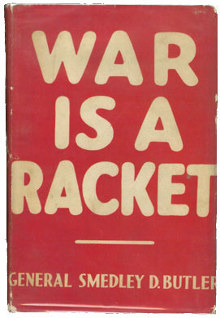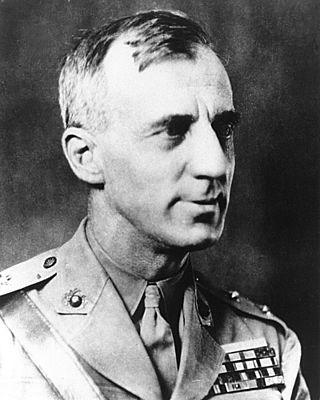
Major General Smedley Darlington Butler, nicknamed the Maverick Marine, was a senior United States Marine Corps officer. During his 34-year career, he fought in the Philippine–American War, the Boxer Rebellion, the Mexican Revolution, World War I, and the Banana Wars. At the time of his death, Butler was the most decorated Marine in U.S. history. By the end of his career, Butler had received sixteen medals, including five for heroism; he is the only Marine to be awarded the Brevet Medal as well as two Medals of Honor, all for separate actions.

The United States occupation of Haiti began on July 28, 1915, when 330 U.S. Marines landed at Port-au-Prince, Haiti, after the National City Bank of New York convinced the President of the United States, Woodrow Wilson, to take control of Haiti's political and financial interests. The July 1915 invasion took place following years of socioeconomic instability within Haiti that culminated with the lynching of President of Haiti Vilbrun Guillaume Sam by a mob angered by his decision to order the executions of political prisoners.

The Nye Committee, officially known as the Special Committee on Investigation of the Munitions Industry, was a United States Senate committee, chaired by U.S. Senator Gerald Nye (R-ND). The committee investigated the financial and banking interests that underlay the United States' involvement in World War I and the operations and profits of the industrial and commercial firms supplying munitions to the Allies and to the United States. It was a significant factor in public and political support for American neutrality in the early stages of World War II.
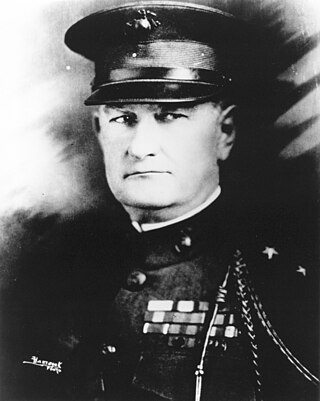
Wendell Cushing Neville was a major general of the Marine Corps as well as a Medal of Honor recipient and the 14th Commandant of the Marine Corps between 1929 and 1930.
The Haitian Campaign Medal was a United States Navy military award which was first established on June 22, 1917, and again on December 6, 1921 for American soldiers participating in the United States occupation of Haiti.

Daniel Joseph Daly was a United States Marine and one of nineteen U.S. servicemen to have been awarded the Medal of Honor twice. Daly and Major General Smedley Butler are the only Marines who earned two Medals of Honor for two separate acts of valor.

Marine Corps Base Camp Smedley D. Butler is a United States Marine Corps base located in the Japanese prefecture of Okinawa. It was named after Marine Corps Major General and twice Medal of Honor recipient Smedley D. Butler.
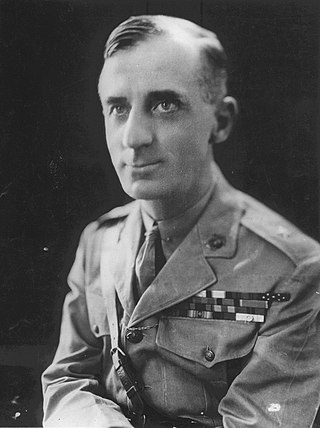
The Business Plot, also called the Wall Street Putsch and the White House Putsch, was a political conspiracy in 1933, in the United States, to overthrow the government of President Franklin D. Roosevelt and install Smedley Butler as dictator. Butler, a retired Marine Corps major general, testified under oath that wealthy businessmen were plotting to create a fascist veterans' organization with him as its leader and use it in a coup d'état to overthrow Roosevelt. In 1934, Butler testified under oath before the United States House of Representatives Special Committee on Un-American Activities on these revelations. Although no one was prosecuted, the congressional committee final report said, "there is no question that these attempts were discussed, were planned, and might have been placed in execution when and if the financial backers deemed it expedient."
Fort Rivière is a ruined mountain fort in Haiti on the summit of Montagne Noire, Saint-Raphaël Arrondissement. It is on the north coast of Haiti to the south of Grande-Rivière-du-Nord and 20 miles south of Cap-Haïtien. It was a French bastion fort that was the site of the defeat of the Haitian rebel force called the Cacos on 17 November 1915.

The Banana Wars were a series of conflicts that consisted of military occupation, police action, and intervention by the United States in Central America and the Caribbean between the end of the Spanish–American War in 1898 and the inception of the Good Neighbor Policy in 1934. The military interventions were primarily carried out by the United States Marine Corps, which also developed a manual, the Small Wars Manual (1921) based on their experiences. On occasion, the United States Navy provided gunfire support and the United States Army also deployed troops.

William Peterkin Upshur was the recipient of the Medal of Honor, the United States' highest military decoration, for his actions in 1915 during the Haitian Campaign.
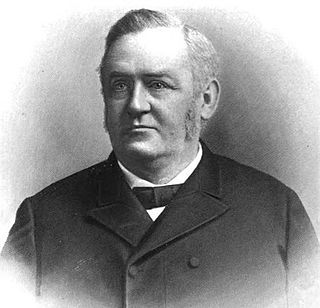
Smedley Darlington was an American politician who served as a Republican member of the U.S. House of Representatives for Pennsylvania's 6th congressional district from 1887 to 1891.

Samuel Gross was a Private in the United States Marine Corps, 23d Company who earned the Medal of Honor for his efforts during the United States occupation of Haiti in 1915.

The United States Marine Forces, South, headquartered in New Orleans, Louisiana, is the Marine Corps service component of the United States Southern Command.
Common Sense was a monthly political magazine named after the pamphlet by Thomas Paine and published in the United States between 1932 and 1946. It was headquartered in New York City.
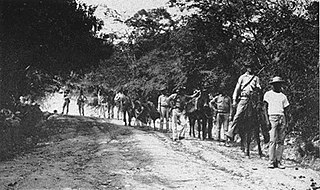
The Battle of Fort Dipitié was fought on 24–25 October 1915 as part of the First Caco War during United States occupation of Haiti. U.S. Marines and rebel Haitians, known as Cacos, fought at the Grande Rivière du Nord which resulted in the destruction of Fort Dipitié, an outpost of Fort Capois.

The Battle of Fort Rivière was the decisive battle of the First Caco War during United States occupation of Haiti in 1915. A combined force of U.S. Marines and sailors defeated Cacos rebels at Fort Rivière, ending the First Caco War.

The Gendarmerie of Haiti, also known as the Haitian Constabulary, was a gendarmerie raised by the United States during its occupation of Haiti in the early 20th century. Established in late 1915, the gendarmerie was operational from 1916 until 1928, during which time it was Haiti's only military force, earning a reputation for active interference in civilian government that may have set the stage for the future politicization of Haiti's armed forces.
The Battle of Port-au-Prince took place on either the 6 or 7 October 1919 when Haitian rebels, known as Cacos, attacked the capital of Haiti during the Second Caco War and the American occupation of Haiti.

Lieutenant General James Tillinghast Moore was a decorated Officer and aviator in the United States Marine Corps, he is most noted for his service as commanding general of the 2nd Marine Aircraft Wing during World War II.
